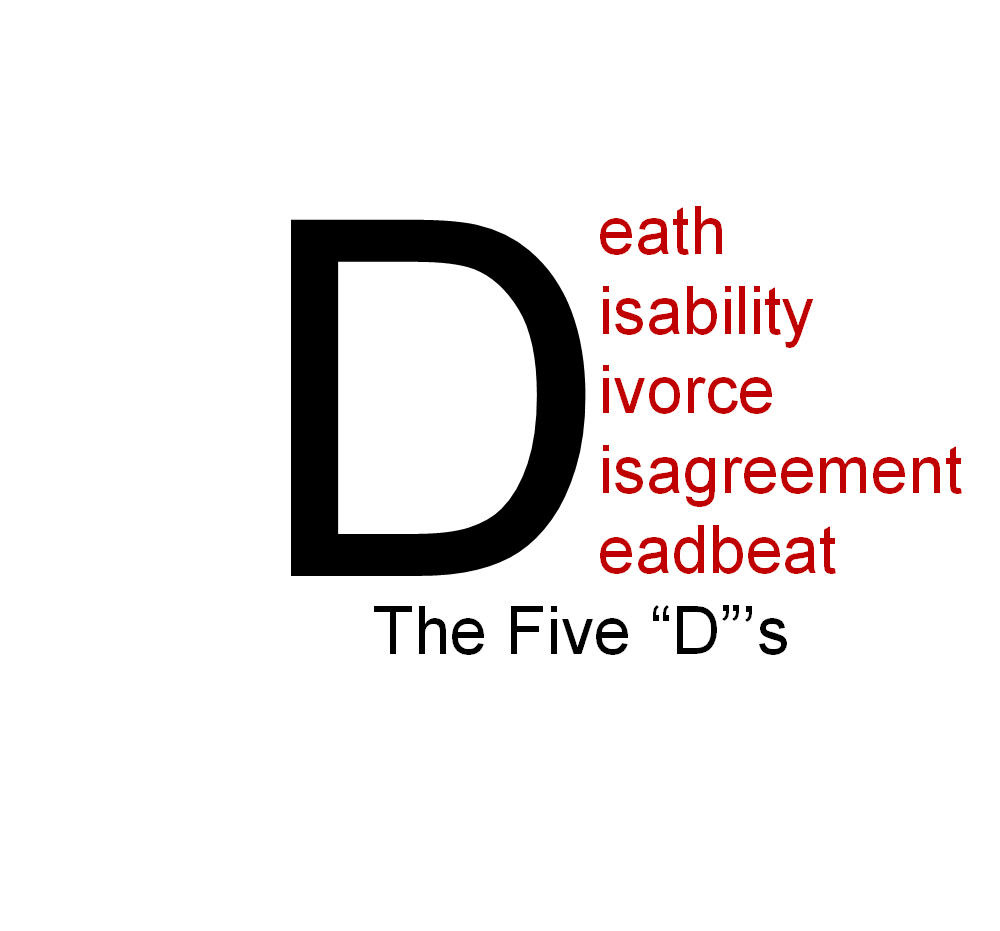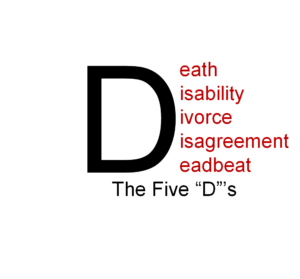
Buy Sell Agreement
Buy Sell Agreements
A Buy Sell Agreement is part of a succession plan to decide in advance what will happen with a business when certain events occur. Such planning is crucial for any business with multiple owners. It is important both when the owners are related to each other and when they are NOT related to each other.
Buy Sell Triggers
A Buy Sell can be “triggered” by several events. We call these the “Five D’s”.
- Death
- Disability
- Divorce
- Disagreement
- Deadbeat
Some Buy Sell agreements, to their peril, only deal with the first three “D’s” and don’t address how to get out if the parties have an irreconcilable disagreement or if one of the parties is a dead beat.
Ironically, business owners set up entities to shelter themselves personally from business liabilities, but then leave themselves exposed to the most likely liabilities of all: the Five D’s. The probability of at least one of the Five D’s occurring over the lifecycle of a business is 100%.
A related issue is whether or not the business owners have a non-judicial mechanism to resolve conflicts or disputes that may arise among them. It has been our experience that it is best to resolve conflict without litigating. To facilitate this, we often employ an Alternative Dispute Resolution procedure called the Integrity Agreement.
Key Persons
Typically, a buy sell agreement is not going to be triggered on one of the Five D’s involving just anyone. It must be involving a “key person.” A key person is the one working in and essential to the business as opposed to such person’s spouse or other family member.
Funding a Buy Sell
When one of the Five D’s happens, the Buy Sell Agreement is triggered, and someone is going to buy the business and someone is going to sell. The money for such a transaction has to come from somewhere. There are only so many available sources for such funds:
- “Self funding” if the party simply has that much money (which I have never seen, ever)

- “Going concern funding” where the future post-sale earnings of the business pay the purchase price
- “Insured funding” where the cash flow derives from an insurance product (life insurance, disability insurance, etc.)
Such funding mechanisms often determine the type of buy sell arrangement.
Type of Buy Sell Arrangements
- Cross Purchase — where each of the parties by life insurance or disability insurance on all the other parties to fund the buy out.
- Redemption — where the buy out is funded by the going concern revenues of the business.
- Combination — where both insurance and the going concern revenues fund the buy out.
A Buy Sell Agreement can have a “Trustee”. Such a Trustee is typically a non-seller/non-purchaser who functions like an escrow to collect the funds and give them to the seller and give the business interest being purchased to the buyer. This Trustee can be a number of parties including the company being bought and sold itself.
Integration with Estate Planning
Buy Sell Agreements don’t happen in isolation. They are always part of a bigger plan. Whenever a Buy Sell Agreement is structured without regard for or independent of the parties’ estate planning, it will have problems.
For example, how life insurance is owned in connection with a buy sell agreement can have significant tax consequences. If the life insurance is owned by the company being bought and sold, it can change the value of the company and the purchase price. It can also trigger Alternative Minimum Taxes on the proceeds of the life insurance. It also causes the value of the life insurance to be included in the taxable estate of the seller. Which means in addition to suffering death, which is bad enough, the seller may also have to pay an estate tax on the value of the company.
In most instances, the life insurance should be owned by an Irrevocable Dynasty Trust. How such an Irrevocable Trust integrates with the business planning is a key factor in advanced estate and business succession planning.
Integrating with Advisors
Building an effective Buy Sell requires a team approach from the advisory team. This might include:
- A lawyer should prepare the Agreement. If the lawyer is acting for one of the parties and not the company, the parties would be well advised to have separate legal counsel.
- An insurance professional to provide Life Insurance, Disability Insurance and other appropriate insurance products as needed.
- A CPA or tax professional to advise on how cash flows are used to pay insurance premiums and the resulting tax consequences to the parties. The CPA will also play an important role in determining the value of the business for purposes of the Agreement.
- An appraisal done by a qualified valuation expert is often necessary.
- Each party will need their own separate estate planning. Failure to do this causes serious issues in the effectiveness of the overall plan.
- A money manager or investment advisor may be involved to address the effective deployment of the company’s cash flow reserves.
- Business succession consultant to help groom the business for sale to a third party or to the parties involved in the buy sell arrangement.
